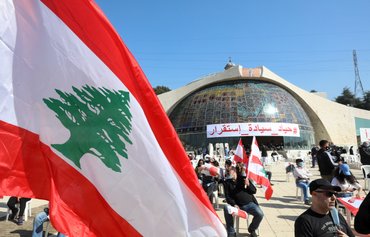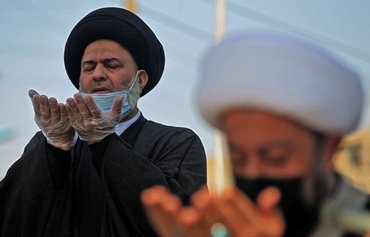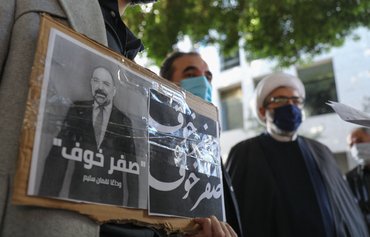Lebanon's military prosecution on Monday (December 14th) sentenced anti-Hizbullah activist Kinda al-Khatib to three years in prison "with hard labour".
Al-Khatib, who is in her twenties, was arrested in June and charged with "collaborating with the enemy", "entering the occupied Palestinian territories" and "collaborating with spies of the Israeli enemy", AFP reported.
Lebanon is technically still at war with Israel and forbids its citizens from travelling there.
Prior to her arrest, al-Khatib on Twitter had criticised Shia Lebanese movement Hizbullah and called for its disarmament, which is seen by both the Lebanese government and the international community as the only possible path by which Lebanon can regain its prosperity.
She also hailed the Caesar Act -- new US sanctions on Syria that came into force June 17th -- which penalises companies worldwide that deal with the regime of Bashar al-Assad, and blocks US reconstruction aid until perpetrators of abuses in Syria's war are brought to justice.
Many in Lebanon fear that the new sanctions will have a detrimental effect on Lebanon unless Hizbullah and other factions break ties with the Syrian regime.
Al-Khatib's family and other activists have denounced her arrest as "political" because of her tweets against those in power.
Lebanese media and activists have drawn a parallel between al-Khatib's case and that of actor Ziad Itani, who was also accused of "collaborating" with Israel in 2017.
Itani was declared innocent and released several months later, and a high-ranking security officer was then charged with "fabricating" the case.
Hizbullah is the only party not to have disarmed after Lebanon's 1975-1990 civil war, since when it has also become a major player in Lebanese politics.
The Shia group is designated a "terrorist" entity by many Western governments.
Hizbullah silencing opponents
Al-Khatib, who has been active in the anti-corruption protests which began in Lebanon last October, was arrested on June 18th in her hometown of Akkar in the north of the country and referred to a military court.
In a thread published on its Arabic-language Twitter account after the arrest, Amnesty International said, "International law rejects the trial of civilians by military courts, whatever the charges against them. We call on the Lebanese judicial authorities to transfer Kinda al-Khatib's case immediately to the civilian courts."
"Military courts lack transparency in their investigations and their justifications of their rulings and only give the defence a limited space to appeal. These conditions violate the rights of civilians to a fair trial," Amnesty added.
That same week, the Public Prosecutor's Office of the Mount Lebanon governorate charged Sayed Ali Al-Amin, a Shia Muslim cleric critical of Hizbullah, with "constantly attacking the [Hizbullah] resistance and its martyrs", "incitement among sects", and "violating the tenets of the [Shia] Jaafari school of [Islamic] thought".
If found guilty, al-Amin could face life imprisonment or even the death penalty.
Lebanese politicians and activists reacted angrily to the arrest of al-Amin, saying the charges against him are politicised and "an attempt by Hizbullah to demonise its religious opponents", according to Arabi 21.
'Ruling is political'
Myriam al-Khatib, Kinda's sister, told Al-Mashareq her sister is an "anti-Hizbullah activist who calls for its disarmament and for imposing the sovereignty of the state and the army".
But that has recently exposed her to threats, she said.
"Kinda was not summoned for the first three sessions of the military court, while in the fourth session on December 14th, they issued their verdict... despite the court's inability to present any evidence against her," she said.
The ruling "is political, since Hizbullah dominates the court, repressing and silencing activists", she said.
"As political activists, we know that the most common charge against us for our criticism of Hizbullah is that of being Israeli agents, without any proof, especially since the military court is politicised and is under great pressure from Hizbullah," activist Ahmed al-Sayed told Al-Mashareq.
"What is happening is malicious arrests and repression under partisan control," he said. "Lebanon is transforming into the Iranian model; indeed, we have become a small Iranian province under the rule of the Hizbullah Basij," in reference to the paramilitary militia under Iran's Islamic Revolutionary Guard Corps.
"Anybody who opposes Hizbullah is threatened... to the point of being killed," al-Sayed said, adding that the party has its own detention facilities and has in the past eliminated opponents, from the Shia sect, in extreme secrecy.

![Lebanon's military prosecution on December 14th sentenced anti-Hizbullah activist Kinda al-Khatib to three years in prison "with hard labour". [Photo via Kinda al-Khatib's Twitter account]](/cnmi_di/images/2020/12/16/27470-lebanon-kinda-khatib-600_384.jpg)






